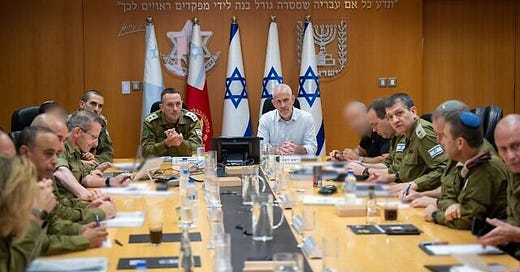57 years ago
In May and early June 1967, men walking through Tel Aviv’s streets were approached and asked to come help dig massive holes in local parks.
These holes were being dug under the auspices of the local Rabbinate. Municipal Rabbis had scouted fields and parks to be repurposed as mass Jewish cemetaries. They were preparing for the worst-case scenario of a potential Arab-Israeli war.
Throughout the Jewish world, fundraising efforts for Israel went into overdrive. Money was sent to purchase all sorts of materiel needed for the war effort, but support from abroad did not assure confidence at home. The main airport at what was then Lod (now Ben Gurion Airport), was so busy with outbound flights that a grim joke began circulating, “Will the last one out please turn off the lights?”
On May 8, 1967, President Nasser of Egypt threatened that, “we shall not enter Palestine with its soil covered in sand, we shall enter it with its soil saturated in blood.” Syria’s defense minister (later President) Hafez Assad, said, “Our forces are now entirely ready not only to repulse any aggression, but to initiate the act ourselves, and to explode the Zionist presence in the Arab homeland in Palestine. I believe the time has come to begin a battle of annihilation.”
Israelis were told to prepare for war. They mobilized their troops. Civilians assisted in digging trenches throughout the country, and they filled sandbags, taping their windows in case of explosions nearby.
On the evening of May 28, 1967, Prime Minister Levi Eshkol took to the airwaves to address his panic-stricken country. The PM, fresh off a cataract procedure, exhausted from late-night meetings in the lead up to the war, and having been rushed to the Tel Aviv studio to deliver the radio address, was, ill-prepared, to say the least. He could not properly read the speech that had been placed in front of him, reading some of it for the first time, trying to understand the handwritten changes made by his aide Adi Yaffe. On live air, he was whispering to Yaffe, “What does this say?” He stumbled and stuttered throughout the speech. To those at home listening, the PM sounded uncertain, and scared. What later came to be known in the history books as the “Stuttering Speech” led to Eshkol being forced to relinquish his other role as Defense Minister, which then (thankfully) necessitated the expansion of the government on an emergency basis, to include opposition parties.
Then, on June 5, 1967, Israel launched a preemptive strike in the face of non-stop Arab threats. That day - by about 4pm - they wiped out the entire air forces of Egypt, Jordan, and Syria.
On June 6, Israel took Gaza, and Jordan retreated from almost the entirety of the West Bank.
On June 7, Israel re-conquered Jerusalem’s Old City, and the Jordanian forces fled. Israel effectively conquers most of the Sinai Peninsula.
On June 8, Egypt accepted a ceasefire, Hebron fell to Israel, and Israel continued pushing the Syrians on the Golan Heights.
On June 9, Israel focused its attention on the Golan Heights, having won the war on all other fronts.
On June 10, Syria accepts a ceasefire too. The war ended with Israel claiming the Gaza Strip, the Sinai Peninsula, the entire West Bank including East Jerusalem, and the Golan Heights. It was at a stunning development. Not one body was buried in a Tel Aviv park.
Six days of war ended in a remarkable and historic victory.
Today
The news from the last few days in Israel has been non-stop.
Remarkably, Israel has taken out some high-profile targets, including Hamas’ Ismail Haniyeh, and Hezbollah’s Fuad Shukr. Today, Israel confirmed that a few weeks ago they did, in fact, successfully assassinate Hamas leader Mohammed Deif.
Israel has shown that they can cover distance, able to hit targets in Yemen over 3,500km away. They have the ability, assassinating Haniyeh at an IRGC apartment in the heart of Tehran, with a bomb placed in the room two months ago. And they have the intelligence, able to take out Shukr in Beirut, someone the Americans have been searching for, for over 40 years. No wonder Ayatollah Khamenei of Iran nervously looks to the sky these days when out in public.
This morning, I woke up to a plethora of WhatsApp updates. Khamenei has ordered his army to launch a direct attack against Israel. In response, Israel’s President Herzog has called on all of Israel to remain vigilant, and to take steps to prepare themselves and their bomb shelters for an imminent attack. These attacks could happen at any minute now.
Iran is apparently considering an attack which includes a combination of drones and missiles targeting military targets in Tel Aviv and Haifa. The Houthis, Hamas (to the extent they can) and Hezbollah, will likely join too.
The Americans and Europeans are holding urgent discussions, as Britain has readied its fleet of warplanes near Cyprus (and two additional bases in the Middle East), and the US Navy has moved aircraft carriers and approximately 18 ships into the Eastern Mediterranean in anticipation of a war. Jordan is preparing, in cooperation with the British and Americans, to address drones and rockets expected to be fired at Israel.
Israel’s Fire and Rescue Commander of Northern Israel has confirmed that the team is preparing for a complex and “multi-sector event.” The IDF has imposed exit restrictions on its soldiers, and the Health Ministry has increased alertness. Combat units on land, air, and sea, cannot leave the country. Factories with hazardous materials in Northern Israel have been instructed to close. The IDF has begun excavation work along the eastern border of the southern Arava to strengthen the border in places where there are insufficient fences.
The Gur Hasidic community has closed their yeshivas in Hatzor HaGlilit in Northern Israel, and are moving their students to Jerusalem until further notice. Generators and extension cables are being distributed in emergency supply units in the holy city of Tzfat.
Prime Minister Netanyahu is meeting with opposition leader Yair Lapid for the first time in two months. The Director-General of the PM’s Office has confirmed that Israel is making accelerated preparations for the outbreak of a multi-front war, which has included the evacuation of a further eight settlements in the north.
Mass shelter sites are being prepared, including the Carmel Tunnels and parking lots throughout the country, ready to receive wounded and casualties.
Israel has warned that “Anyone who attacks us will pay a heavy price. Our long arm will reach anyone who tries to harm us. We have received threats from all sides - we are prepared for any scenario.”
I have faith - ani ma’amin
Today is the 300th day of Israel’s war in Gaza. It may be day 1 of Israel’s war with Iran.
2024 is not 1967. The landscape, the politics, the players, the ability, the technology, and the stakes, are all different.
But one thing remains the same. Israel has a secret weapon: ein brera - no alternative.
I write comfortably from my home in Thornhill, not directly threatened by the forces that wish to do Israel harm. Thankfully I do not need to rush with my children to a bomb shelter, or pray that the skies will be protected by Israel’s military might. But on days like today, my heart and soul are with my brothers and sisters in Israel. I am thinking about those preparing for combat, for those still held hostage in Gaza, and for those kissing their children and spouses good-bye as they head off to their bases.
Today, I pray for a speedy victory over our enemies. I have faith in our military leaders, and in those tasked with securing the future of our Jewish State.
We have seen miracles before, just like in 1967, and may we all merit to see another one soon.
Am Yisrael Chai.













Thank you for your trusted update of this evolving situation and expressing how we, as Canadians, all feel during these most difficult times.
Adam, all of your essays are excellent. This one in particular has touched me, and reflects how many of us are feeling at this moment. We pray, and we hope for the best outcome. And on day 300, we continue to pray for the release of all our hostages from the hell of Gaza.